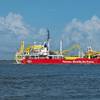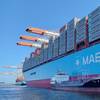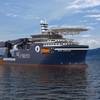Bollinger Marine Fabricators, Amelia, La., delivered DBL 81, an
80,000-barrel ocean service, double hull, oil tank barge built to meet
the requirements of the Oil Pollution Act of 1990 (OPA '90) to K-Sea
Transportation Corp., Staten Island, NY. It is the second of a four OPA
'90 barge contract underway at Bollinger for K-Sea. DBL 101, a 100,000
BBL barge, the first of the four was delivered by Bollinger in July,
2002. The remaining two barges in the contract will each have
capacities of 80,000 and 100,000 BBL's, and are scheduled for delivery
in the second and fourth quarter of 2003. DBL 81 was built to a new
design provided by Guarino and Cox naval architects and marine
engineers, Mandeville, La., which was adapted from a Richard Taubler
Inc. design.
The barge is coupled with an existing K-Sea tug, JAVA SEA, using a
connection system designed and delivered by Acomarin Engineering. While
the DBL 81 was in the final stages of construction, Bollinger Gulf
Repair, L.L.C., retrofitted the JAVA SEA with a JAK coupler system, The
Acomarin system is designed to increase operating efficiency and enhance
safety and reliability by operating as a dual mode ITB.
DBL 81 will feature double block cargo segregation, segregated ballast,
cargo monitoring - as well as advanced electrical and hydraulic systems.
The unmanned barge features an eight-foot high trunk deck--increasing
cargo capacity, and is designed to carry Grade A oil and other petroleum
products in ten tanks with capacities from 8312 BBL to 8668 BBL each.
Detroit Diesel series 60 engines power cargo and hydraulic pumps and the
generator is powered by a Detroit Diesel series 71 engine. The new barge
is equipped with a vapor recovery system sized for a maximum loading
rate of 17,500 BBL per hour. The barge's two discharge pumps can
discharge a total of 9,400 BBL per hour, and the ballast system is
outfitted with two Byron Jackson hydraulic deepwell pumps.
"The legislation signed by President George H. Bush, in August 1990, and
international regulations that followed, requires that nearly all
vessels used to transport oil will have double hulls by the year 2020 to
help protect against spills caused by hull punctures," said Scott
Theriot, executive vice president new construction of Bollinger
Shipyards, Inc. "Recent oil spills have focused renewed attention on
single hull petroleum vessels and the pertinent legislation thereto.
Some interests want that period shortened. Bollinger is in a unique
position to build OPA '90 vessels as our multiple shipyards have the
design experience, the history of building numerous OPA '90 barges and
the production capacity to build several of them simultaneously. As the
phase out period gets closer, production capacities will shrink and
prices may rise. Now is the time to plan and build to have an orderly
transition into the new requirements."
Featured videos

Inmarsat Enhances Service to Drive Digitalization

Inside the Electrified Truckable Tug

Tracking Foreign Vessels Working in the U.S. Jones Act Market
Subscribe for
Maritime Reporter E-News
Maritime Reporter E-News is the maritime industry's largest circulation and most authoritative ENews Service, delivered to your Email five times per week









